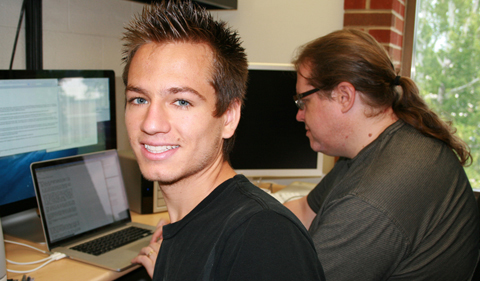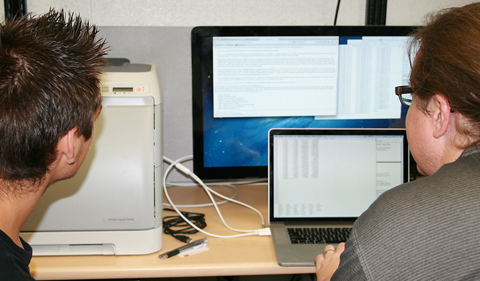By Ryan Goetz
B.S. Astrophysics, Class of 2017
I worked this summer with Dr. Doug Clowe, Associate Professor of Physics & Astronomy at Ohio University, on a set of computer simulations of galaxies and galaxy clusters, along with gravitational lensing techniques, to estimate the mass of these objects. The ultimate goal of the project will be to more accurately estimate the percentage of regular and dark matter in the universe.
The hardest part for me was learning to write the Perl programs, which we used to format and analyze the data. Dr. Clowe loaned me a book that had a good introduction to Perl. By reading this, and by working on more specific issues with Dr. Clowe, I became more comfortable with writing programs (although I am certainly no expert!). At first, when I was doing mostly reading, I would meet with him to discuss various topics about once a week. Later, once I began programming and handling data, I needed more help and thus met with him almost every day.
As Dr. Clowe explained it, we used the weak lensing shear signal to measure the masses of the clusters using a variety of techniques and comparing to the actual masses from the simulation in order to determine which of the techniques return accurate masses and whether any of them can be tweaked to improve their accuracy. These techniques will be used with the LSST survey in a few years’ time to measure cosmology using the mass function of galaxy clusters.
I learned how complex computer simulations could be while still accurately representing real phenomena. The experience just helped me realize that you don’t need to directly see things (such as galaxy clusters interacting) to understand how they work. I learned about some basic functions of Perl and how they are used in astronomy. The best part of the summer experience was getting the opportunity to do real work. In contrast to classes, in which the goal of the work is to prepare yourself for some future occupation, my research experience allowed me to do something that may help advance our scientific knowledge, which is pretty cool to think about.
Ryan Goetz – Intern with Dr. Doug Clowe – sophomore at Ohio University – College of Arts & Sciences – astrophysics major





















Comments